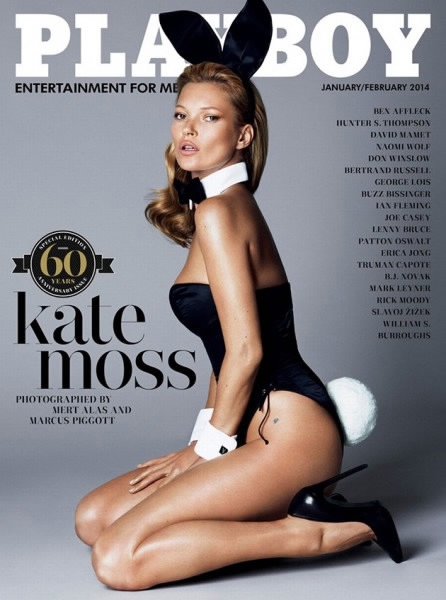
Culture
11:54, 29-Sep-2017
With Hefner gone, Playboy's impact on women still has people talking
CGTN

Playboy degraded women, it empowered women. It liberated them and objectified them.
The legacy of the iconic magazine founded six decades ago by Hugh Hefner, who died Wednesday at 91, remains a topic of heated debate, especially its impact on women.
Playboy brought nudity into the mainstream and paved the way for the proliferation of hard-core pornography while shaking up a culture which had long kept sexuality in the shadows.
While Hefner and his magazine drew fire from some women's advocates, others said Playboy's impact could be seen as positive in many ways.
Carrie Pitzulo, a Colorado State University instructor and author of a 2011 book, "Bachelors and Bunnies: The Sexual Politics of Playboy," argues that the magazine's impact has been more complex than it appears on the surface.
"My assumption had been it was a very sexist magazine," Pitzulo said.

Cover of a Playboy issue /Photo via Playboy
Cover of a Playboy issue /Photo via Playboy
"But once I started diving in I discovered there was lot more going on."
Pitzulo said Playboy enabled "a lot of progressive messages" and that "it was much more pro-women than many gave it credit for."
Playboy and Hefner supported abortion rights, access to birth control and the Equal Rights Amendment, and gave funding to rape crisis centers, she noted.
In the early years of Playboy, "the Playmates were significant in telling the world that good girls like sex too – that wasn't said in the 1950s and 1960s."
In that sense, Pitzulo argued that Playboy helped combat a notion "that you were either a good girl or a bad girl, that there were no other choices."
'Complicated' sexual freedom
Others offer a different interpretation of Playboy's impact on society.

Cover of a Playboy issue /Photo via Playboy
Cover of a Playboy issue /Photo via Playboy
Elizabeth Fraterrrigo, a Loyola University Chicago professor, argued in her 2011 book, "Playboy and the Making of the Good Life in Modern America," that the values in Playboy were not quite as feminist as Hefner and his supporters claimed.
She wrote that Playboy promoted "a sexualized popular culture (which) complicates notions of sexual freedom," and that the magazine became "an authoritative arbiter of beauty and sex appeal" while "driving the culture to embrace narrow standards of physical attractiveness and sexual expression."
'Commodification' of women
Some blamed Playboy for creating a looser moral climate, claiming it led to exploitation and hard-core pornography.
Patrick Trueman, president of the National Center on Sexual Exploitation, said that Playboy "popularized the commodification of the female body in soft-core pornographic magazines in the 1960s, and it laid the groundwork for the public health crisis of Internet pornography that America is experiencing today."
Frederick Lane, a New York author of "Obscene Profits: The Entrepreneurs of Pornography in the Cyber Age," said that "We can't lay all the blame for (the pornography epidemic) on Hefner's feet," and that his legacy is complicated.
"He did improve the position of women in society by opening up the discussion of sex," Lane said.

Photo via yahoo.com
Photo via yahoo.com
"The flip side of that is that his view of women in a sexual relationship was a relatively narrow one, although I think it extended as he got older."
Lane said Hefner's support for transgender causes and his featuring a transgender model in Playboy "was revolutionary in his time."
Jennifer Lena, a Columbia University sociologist, said the impact of Playboy and Hefner on women is not just about sexuality.
She pointed to "Playboy´s contribution to advancing and defending the freedom of the press, fighting back retrograde obscenity laws, and advancing the rights of women to express their sexuality. "
Lena noted that Playboy also broke ground by publishing Charles Beaumont´s "The Crooked Man," in 1955, a dystopian story where heterosexuals are persecuted in the same manner of homosexuals at that time.
"I think Playboy was far more important to the culture than just sex," said Rebecca Lieb, an independent media analyst.
"Playboy was a publisher of great stories, and Playboy and Hefner were champions of free speech and civil rights," she said.
Lieb said that some women may have been offended by Playboy's sexuality, but that "this was not done in a manner of exploitation or coercion."
In China
Although Playboy's culture influenced almost the entire world, China is not part of it, since pornography is totally banned here.
Yet it didn't stop Hefner's death from making the headlines of major media and social networks in China. Even though few have read the publication, most people here have heard about Playboy.
But for the majority of Chinese, it's the first time for them to know the almost legendary life story of Hefner.
Source(s): AFP

SITEMAP
Copyright © 2018 CGTN. Beijing ICP prepared NO.16065310-3
Copyright © 2018 CGTN. Beijing ICP prepared NO.16065310-3